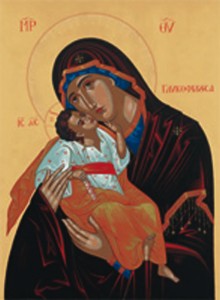Jesus’ Mother lived by faith
This article was prompted by an earlier article on what Jesus knew.
Scripture writer Brother Kieran gives a scholarly reflection on what Jesus and Mary knew.
 One of the great challenges presented to the Gospel reader today is to look beyond the literal level of the text to see the meaning below the text. This is the challenge presented in article 126 in the Catechism of the Catholic Church when it calls us to recognise three – not one – stages in the composition of a Gospel. Recognising that out of Easter came the Gospels we then see that every Gospel was written in the knowledge of how it all turned out. Later awareness permeates the Gospel text as to who Jesus was and the meaning of what he said and did. John 2:21-22 is just one text that speaks of remembering and later enlightenment as part of the testimony in the Gospel.
One of the great challenges presented to the Gospel reader today is to look beyond the literal level of the text to see the meaning below the text. This is the challenge presented in article 126 in the Catechism of the Catholic Church when it calls us to recognise three – not one – stages in the composition of a Gospel. Recognising that out of Easter came the Gospels we then see that every Gospel was written in the knowledge of how it all turned out. Later awareness permeates the Gospel text as to who Jesus was and the meaning of what he said and did. John 2:21-22 is just one text that speaks of remembering and later enlightenment as part of the testimony in the Gospel.
The authoritative Pontifical Biblical Commission draws attention to two important areas in understanding who Jesus was:
1. “After Jesus rose from the dead and his divinity was clearly perceived” (my emphasis) – by implication, this was when those he walked among perceived who he was in the fullest meaning as Son of God.
2. “The apostles passed on to their listeners what was really said and done by the Lord with that fuller understanding which they enjoyed” – taught by the Spirit.
What Mark reports at the Baptism of Jesus is that there was an affirmation of Jesus’ unique relationship with the God he called his Abba. He is affirmed as Messiah and Son (cf. Psalm 2, a royal adoption psalm). Later Gospels push the recognition of Jesus’ unique filial relationship to his birth in Annunciation accounts, with John pushing it back to “In the beginning.” The Adoptionist heresy stated that Jesus was adopted as God’s son at his baptism. The other Gospels assert divine identity from birth (Matthew and Luke), and pre-existence (John). Even that much is a clear indication that there was a development in thinking about Jesus between his ministry and the writing of the Gospels.
Mary lived by faith, like us, not having all the answers
Is it not precisely because of Jesus’ life, death and Resurrection that the whole notion of God in first century Judaism had to be dramatically rethought? How could an Orthodox Jew accept Jesus as divine in the face of the monotheism on which Judaism is based? How many centuries would it take for One God and Three Persons to be established Christian teaching? What is implicit in the Gospels takes centuries to become explicit.
How does this all impact on our understanding Mary’s role? As with Jesus, each Gospel gives a different picture. When Matthew and Luke came to describe the moment when she gave her assent to the Incarnation, they drew on the description and form of earlier vocation calls to the great mothers of Israel. Annunciation accounts permeate the Old Testament. No! Mary was not given all the answers. Like everybody else, it was only after the Resurrection she would have come to the realisation of the full significance of her vocation, that of Mother of God. Otherwise the Gospel pieces do not work out. How could she question her son on the reason for leaving them in the Loss in the Temple? How could she join the family group who wanted to take him home because they thought him beside himself?
St. Teresa of the Child Jesus put it so well:
‘For a homily on the Blessed virgin Mary to please me, I must see her real life. Sermons show her as unapproachable, but they should present her as able to be imitated, bringing out her virtues, saying that she lived by faith, like ourselves, giving proof from the Gospels. Yes. That is it. She lived by faith, not having all the answers - and like us, struggling with the question of who this mysterious Son of hers really is.
 Entries(RSS)
Entries(RSS)